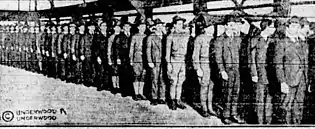| Harvard ROTC | |
|---|---|
 | |
| Active | Founded in 1916 |
| Country | United States of America |
| Allegiance | United States Navy, United States Army |
| Role | Officer Training |
| Garrison/HQ | Cambridge, Massachusetts |


_the_Honorable_Ray_Mabus%252C_left%252C_and_Harvard_President_Drew_Faust_sign_a_Memorandum_of_Agre.jpg.webp)

Harvard ROTC was one of the first Reserve Officers' Training Corps (ROTC) units in the country, founded in 1916.[1] The original program was led by Captain Constant Cordier.[2][3] By the fall of 1952 forty percent of the incoming freshmen class at Harvard University enrolled in programs that led to a ROTC commission.
Harvard has the third most graduates who have received the Medal of Honor. With eighteen recipients, only West Point and the US Naval Academy have more.[4]
In 1969, in the middle of sometimes violent protests over the Vietnam War, Harvard downgraded the status of ROTC to an extracurricular activity. The cited reason was over academic standards on coursework.[5] The military’s official departure from Harvard began in the years that followed.[6][7] For the next several decades Harvard’s connection to ROTC was by allowing their students to take ROTC courses at Massachusetts Institute of Technology.
By 1994, in the midst of the controversy over the Don’t Ask Don’t Tell (DADT) law on homosexuality, Harvard committed to upholding ROTC ties, but only through indirect alumni contributions. This compromise prevented all ties from being severed as was recommended in the 1992 faculty committee report.[8][9]
Harvard University President Drew Faust promised a return of ROTC to campus, once DADT was repealed, in a speech with Chairman of the Joint Chiefs Admiral Mike Mullen at the Kennedy School of Government on 17 November 2010.[10] In December 2010 Congress passed a bill to repeal President Bill Clinton’s 1993 DADT Policy.
On March 4, 2011, Harvard University President Drew Faust signed an agreement with Navy Secretary Ray Mabus formally recognizing the return of Naval ROTC to Harvard’s campus.[11][12] According to the agreement's terms, a Director of Naval ROTC would be appointed, and Harvard would provide funding for the program. The Navy agreement was structured to go into effect when the repeal of DADT was implemented, and was followed by a similar agreement with the Army.[13][14] President Barack Obama, who in his 2011 State of the Union address called on all universities to open their doors to ROTC,[15] responded through his spokesman by saying:
With our nation at war, this sends a powerful message that Americans stand united and that our colleges, society and armed forces are stronger when we honor the contributions of all our citizens, especially our troops and military families who sacrifice for our freedoms. As the president said in the State of the Union, it is time to move forward as one nation.
— Jay Carney, President Obama’s Spokesman[16]
Harvard Medal of Honor recipients
Notable alumni
- Anthony Brown, Harvard College (1984) and Harvard Law School (1992), U.S. Representative (MD-4) and Colonel in the U.S. Army Reserve.
- Eliot A. Cohen, Harvard College (1977) and Harvard University (Ph.D. 1982), Counselor in the U.S. Department of State (2007–2009), Director of the Strategic Studies Program at the Paul H. Nitze School of Advanced International Studies of the Johns Hopkins University.
- Paul G. Kirk, Harvard College (1960) and Harvard Law School (1964), Chairman of the Democratic National Committee (1985–1989), U.S. Senator from Massachusetts (2009–2010).
References
- ↑ "The Harvard Veterans History Project". Archived from the original on 2011-06-21. Retrieved 2011-04-19.
- ↑ "Harvard Crimson 3 January 1916: Captain Cordier in Command". Archived from the original on 19 September 2016. Retrieved 29 January 2022.
- ↑ "Harvard Crimson 23 September 1916: Reserve Force Proposed". Archived from the original on 19 September 2016. Retrieved 29 January 2022.
- 1 2 "Advocates for Harvard ROTC: Medal of Honor Recipients from Harvard University". Archived from the original on 2011-07-14. Retrieved 2011-04-19.
- ↑ "What to Do About ROTC: Extract from the Minutes of Special Meeting of the Faculty of Arts and Sciences, Harvard University, February 4, 1969". Archived from the original on May 8, 2021. Retrieved January 29, 2022.
- ↑ "Harvard Crimson 12 August 1969: Army Plans to Terminate Harvard ROTC in 1970; Air Force Stays Until '71". Archived from the original on 19 September 2016. Retrieved 29 January 2022.
- ↑ "23 June 1971: Letter from the Office of the Chief of Naval Personnel to the Commanding Officer of the Harvard NROTC Unit on its Disestablishment". Archived from the original on 7 July 2010. Retrieved 29 January 2022.
- ↑ "2 October 1992: Report of the Harvard University Committee on the Status of ROTC". Archived from the original on 5 April 2021. Retrieved 29 January 2022.
- ↑ "Harvard Crimson 1 December 1994: Report Upholds ROTC Tie, But Without Direct Funding". Archived from the original on 6 October 2012. Retrieved 19 April 2011.
- ↑ "Harvard Crimson 18 November 2010: Drew Faust Endorses Return of ROTC". Archived from the original on 11 June 2021. Retrieved 29 January 2022.
- ↑ "Harvard Crimson 4 March 2011: Harvard Signs Agreement To Officially Recognize Naval ROTC". Archived from the original on 1 August 2017. Retrieved 29 January 2022.
- ↑ "Advocates for Harvard ROTC article 4 March 2011: Harvard - Navy ROTC Agreement Signed". Archived from the original on 24 April 2016. Retrieved 29 January 2022.
- ↑ "Harvard Crimson 22 March 2012: After 43 Years, Army Welcomed in Harvard Yard Once More". Archived from the original on 17 November 2021. Retrieved 29 January 2022.
- ↑ "Advocates for ROTC article 28 March 2012: Harvard Army ROTC Office Opening Ceremony". Archived from the original on 22 October 2015. Retrieved 29 January 2022.
- ↑ "25 January 2011: Remarks by the President in State of Union Address". 25 January 2011. Archived from the original on 22 January 2022. Retrieved 29 January 2022.
- ↑ url=http://www.defense.gov/news/newsarticle.aspx?id=63043%7Ctitle=Obama Spokesman Applauds ROTC Return to Harvard